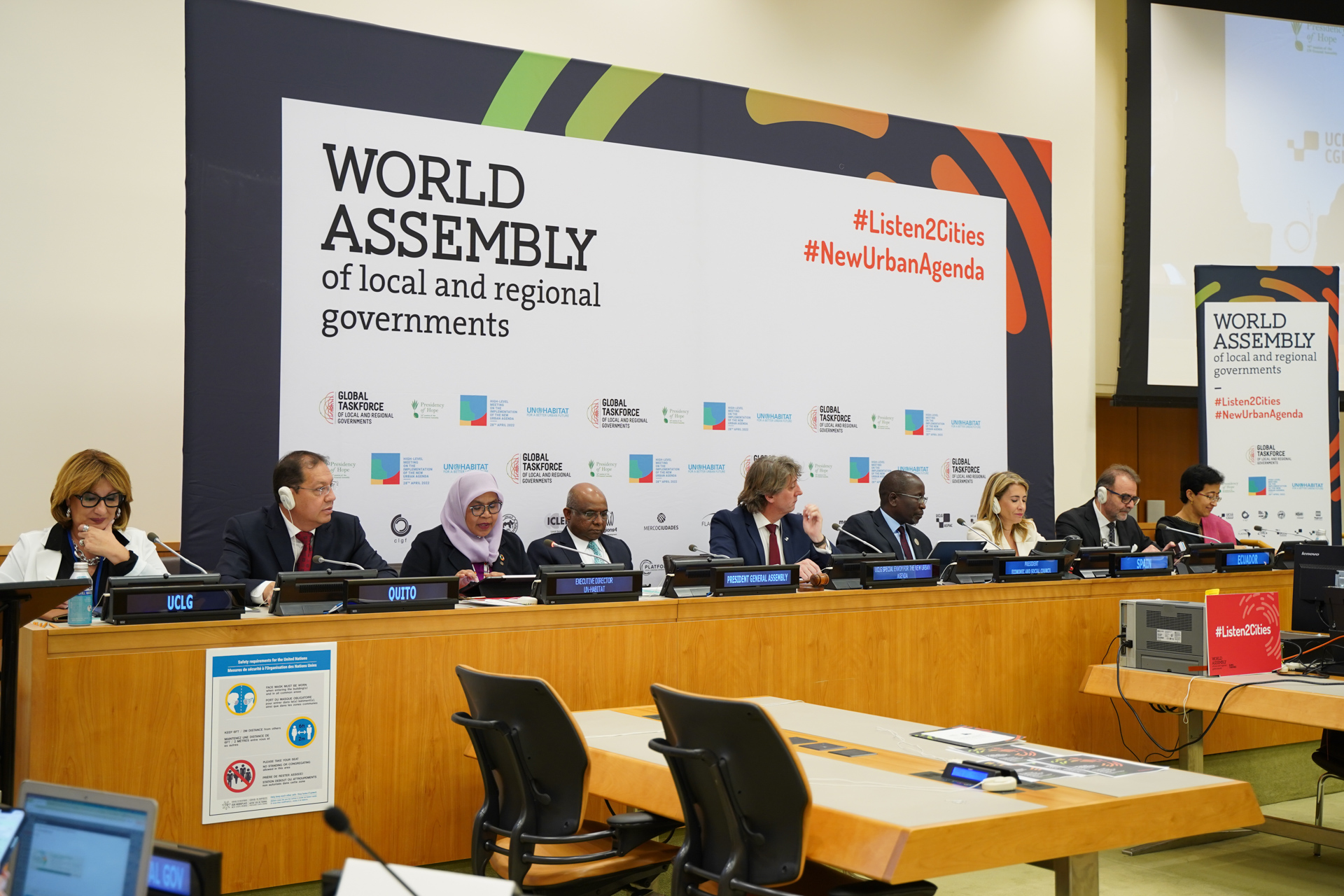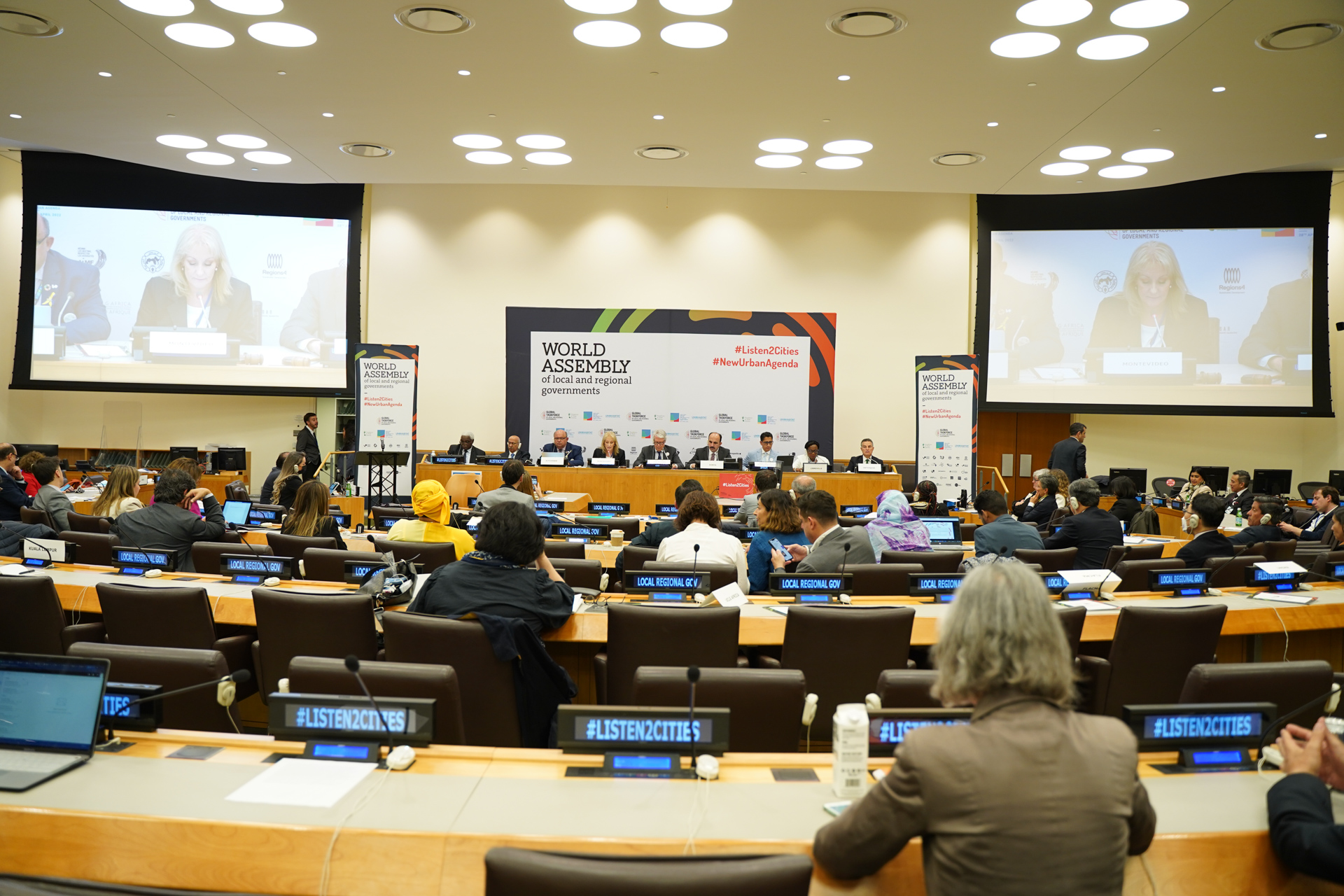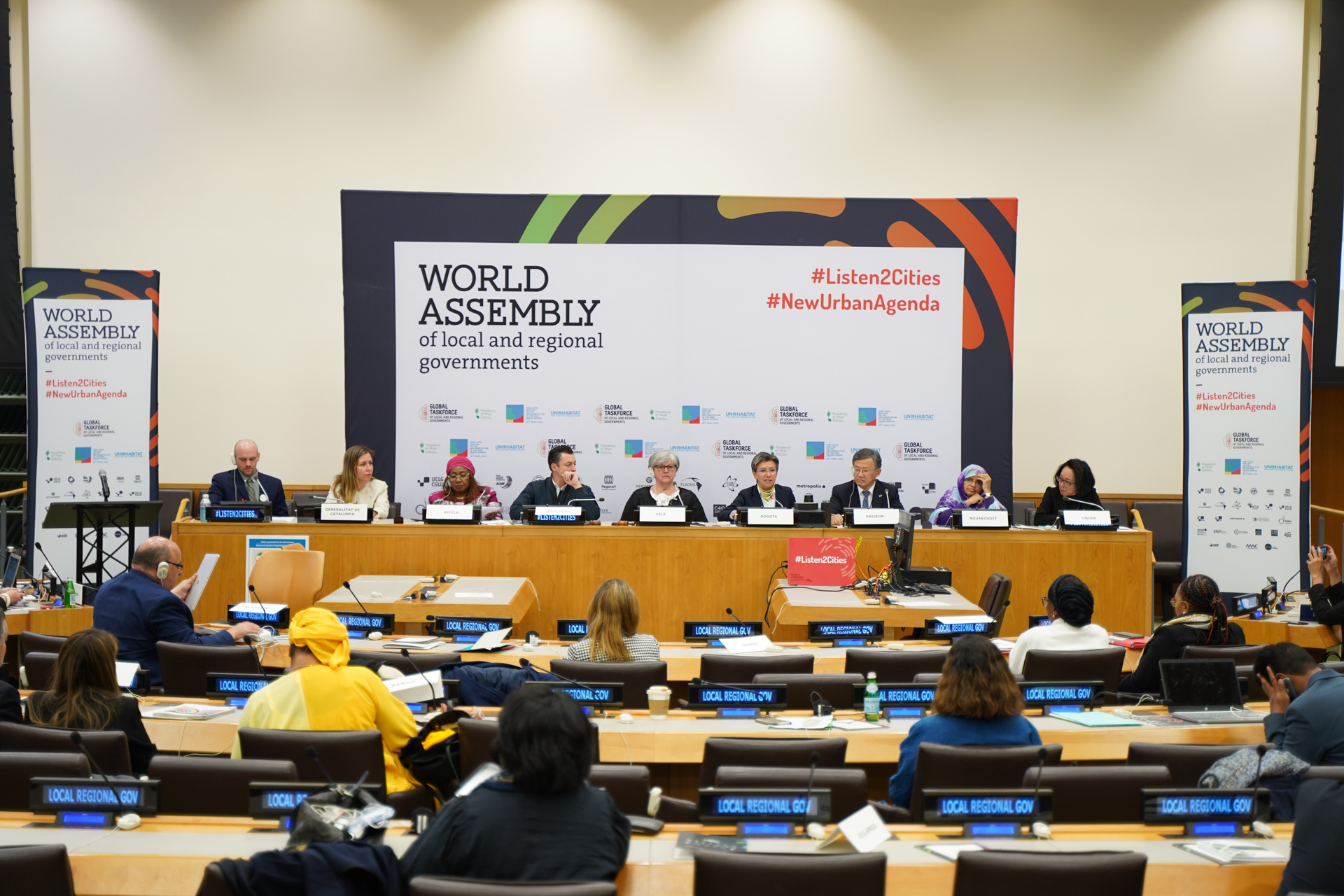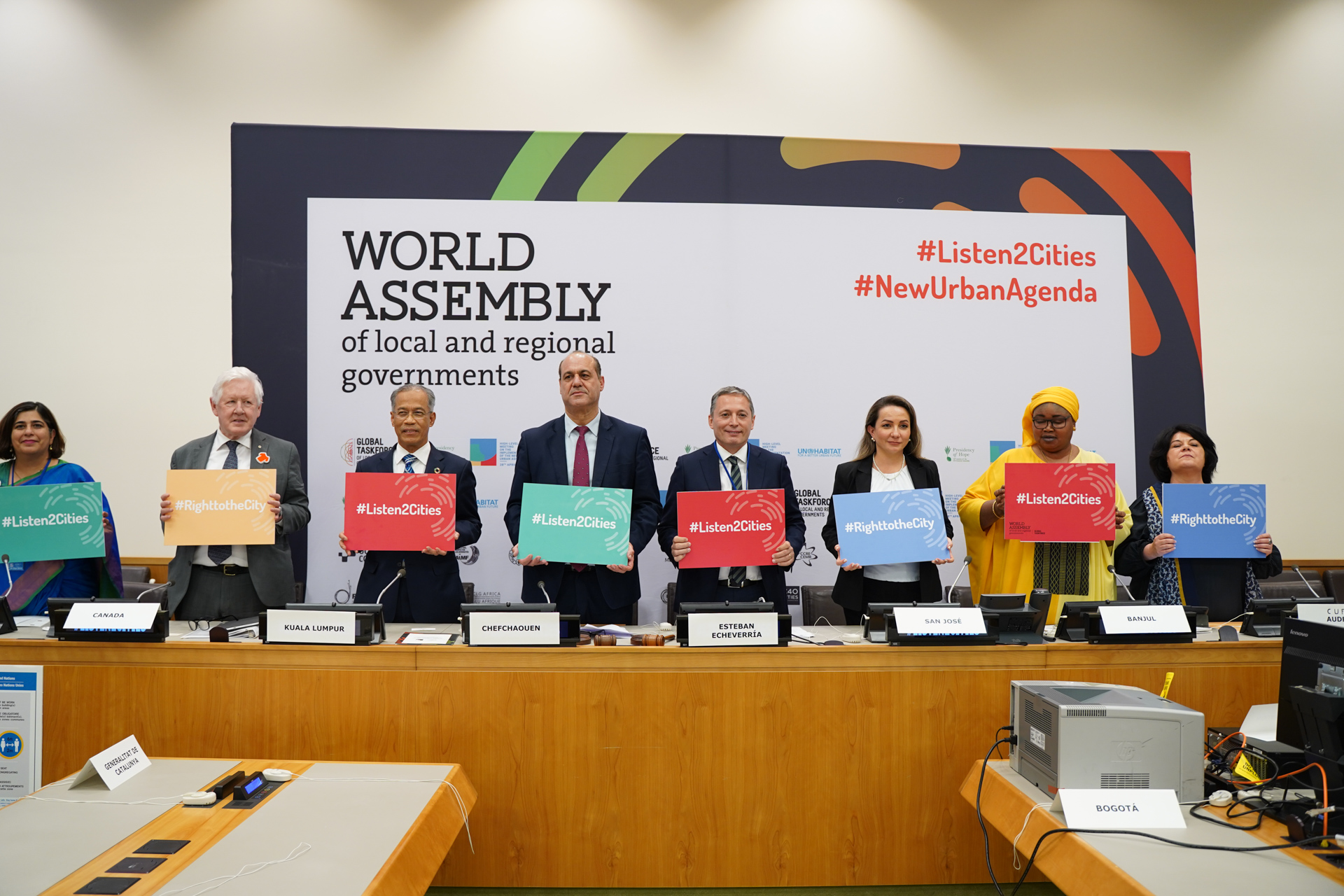The voice of local and regional governments reaches the High Level Meeting on the review and follow up of the New Urban Agenda convened by the H.E. the President of the United Nations General Assembly
12.05.2022
On the occasion of the High-level Meeting on the review and follow up of the New Urban Agenda convened by H.E. the President of the United Nations General Assembly Mr. Abdulla Shahid, the organized constituency of local and regional governments gathered in the World Assembly of Local and Regional Governments. The World Assembly is convened by the Global Taskforce of Local and Regional Governments (GTF) and facilitated by United Cities and Local Governments (UCLG).
Local and Regional Governments Day
Prior to the meeting of the World Assembly of Local and Regional Governments, which focused on the need to deepen the debate around the recognition of local and regional governments as recognized actors, central for the acceleration of the 2030 Agenda, the local and regional governments’ day offered an opportunity for the constituency to take stock of the achievements and challenges ahead of the six years of the adoption of the New Urban Agenda, and to bring together partners from the civil society to develop joint positions ahead of the High-Level Meeting.
Uğur İbrahim Altay, Mayor of Konya and UCLG Co-President opened the local and regional governments’ briefing, highlighting the importance of the High-Level Meeting for our constituency: “It is an opportunity to not only show our commitments, but to make it clear that only through empowered local and regional governments can we achieve the New Urban Agenda.
In turn, Carlos Martinez, Mayor of Soria, UCLG Governing President and UCLG Special Envoy for the New Urban Agenda noted the great commitment of the constituency to accelerate the global goals and all other universal development agendas.
The opening was followed by a preparatory session for the World Assembly of Local and Regional Governments to take stock of the implementation of the New Urban Agenda five years after its adoption. The meeting included remarks by Carolina Cosse, Mayor of Montevideo and UCLG Vice-President for Latin America, Carola Gunnarsson, Mayor of Sala and Vice-President for Europe, Christine Mba Ndutume, Mayor of Libreville and President of UCLG Africa, Berry Vrbanovic, Mayor of Kitchener and UCLG Treasurer, and Frank Cownie, Mayor of Des Moines.
As the New Urban Agenda is the first document of its kind to enshrine the Right to the City principles and proposals, this formal briefing was followed by a dialogue between key actors involved in the mobilization around the right to the city. The session “The Right to the City as an accelerator for the implementation of the New Urban Agenda” aimed to discuss how joint strategies can be developed and strengthened.
Emilia Saiz, UCLG Secretary General stressed the importance of Civil Society in holding the local and regional government constituency accountable and in identifying pathways towards equality and human rights, all which the Right to the City embodies”.
Adriana Allen, President of Habitat International Coalition emphasized that those that experience realities locally, local actors, civil society and local and regional governments are those enabled to monitor progress on the New Urban Agenda.
Lorena Zarate from the Global Platform for the Right to the City reminded us of the difficulties around securing the recognition of the Right to the city in the New Urban Agenda and the importance of fostering the alliances that have made it possible.
World Assembly of Local and Regional Governments
The World Assembly of Local and Regional Governments focused on stressing the importance of deepening the debate on the recognition of local and regional governments as political actors contributing to build a long-lasting partnership to localize the universal development agendas.
The Assembly was structured around three key axes: 1) local public service provision and the right to the city, 2) equality, finance, and green deals and 3) multilevel governance, intermediary cities and renewed planning models. It included the participation not only of local and regional governments but also of representatives of national governments and other stakeholders.

The opening moderated by Emilia Saiz, UCLG Secretary General counted with the participation of Abdulla Shahid, President of the UN General Assembly, Collen Vixen Kelapile, ECOSOC President, Maimunah Mohd Sharif, UN-Habitat Executive Director, Carlos Martinez, UCLG Governing President and UCLG Special Envoy for the New Urban Agenda, Atishi Marlena, Vice-President of UNACLA, Member of Legislative Assembly, National Capital Territory of Delhi, India; Vice-President of ICLEI – Local Governments for Sustainability Santiago Guarderas Izquierdo, Mayor of Quito, Ambassador Cristian Espinosa Cañizares, Permanent Representative of Ecuador to the United Nations and Raquel Sánchez, Minister of Transport, Mobility and Urban Agenda, Spain.
The opening session was followed by a discussion around the priorities for local and regional governments regarding the New Urban Agenda, notably local public service provision and the right to the city, i.e., housing, health, digitalization, and multilevel governance. The discussion was facilitated by the Secretary General of UCLG Africa, Jean-Pierre Elong Mbassi.

Uğur İbrahim Altay, Mayor of Konya and UCLG Co-President highlighted the importance of addressing inequalities. Carolina Cosse, Mayor of Montevideo, UCLG Vice-President for Latin America, who stressed the importance of women and feminist leadership presence in decision-making positions at all levels of governance. In turn, Anibal Gaviria, Governor of Antioquia, recalled the importance of communicating the New Urban Agenda to mobilize communities and regions alike. Mayor of Des Moines, Frank Frank Cownie, underlined the local level as a crucial sphere of governance towards the implementation of the New Urban Agenda. Christine Mba Ndutume, Mayor of Libreville, stressed the role of the Global Taskforce in raising the voices of local governments to the global decision-making tables.
During the same session, Franklin Galarza, President of the Association of Municipalities of Ecuador spoke on the need to advance SDG 11 providing decent housing; Daniella Levine Cava, Mayor of Miami-Dade County highlighted the critical role cities play in leading on climate action. Berry Vrbanovic, Mayor of Kitchener and UCLG Treasurer, bring to the table the importance of the principles and policies that are included in the New Urban Agenda as accelerators for the SDGs, and further commended the local and regional governments constituency to leverage the linkages between the New Urban Agenda, multilevel governance, and service delivery on healthcare, access tohousing, or technology, among others.
The second axis of the World Assembly was dedicated to assess the challenges lying ahead to accelerate effective action, paying particular attention to the lessons learned during the COVID-19 pandemic. The session included recommendations by local and regional representatives on policy areas such as social inclusion and financing, equality, migration, green deals, right to the city, and finance gaps.

The session was introduced by Kale Roberts, Senior Program Officer at ICLEI USA. The remarks were delivered by, inter alia, Claudia López, Mayor of Bogotá, Carola Gunnarsson, Mayor of Sala, María Galindo, from the Regional Government of Catalonia, Luis Donaldo Colosio, Mayor of Monterrey, Fatimetou Abdelmalick, President of Nouakchott, Mbarka Bouaida, President of the Guelmim Oued Noun Region and President of the Association of Regions in Morocco, and Macoura Dao, President of REFELA and Mayor of Foumbol. Mami Mizutori, Special Representative of the Secretary-General for Disaster Risk Reduction was also part of the session panel.
During this session,Vice Mayor of Daejeon Kim Myung Soo presented the UCLG Congress as the place where local and regional governments will be breaking through as one, and will bring local leadership and international actors together to deliver the scenario that the Common Agenda has envisioned, and to develop a better world for our people, and for the planet, through the potential of local governance.

The last session of the World Assembly addressed the importance of the New Urban Agenda as the cornerstone towards the achievement of one universal development agenda. It brought about recommendations on multilevel governance, new service delivery, the role of intermediary cities, and renewed planning models and infrastructures. The session counted with the interventions of Fernando Gray, Mayor of Esteban Echeverria, Mahadi Che Ngah, Mayor of Kuala Lumpur, Mohamed Sefiani, Mayor of Chefchaouen, Ambassador Bob Rae, Permanent Representative of the Mission of Canada to the UN, Pablo Jurado, President of CONGOPE and Prefect of Imbabura, Paula Vargas, Mayor of San Jose, Rohey Malick Lowe, Mayor of Banjul, and Valérie Dumontet, Vice-President of Aude. The session was facilitated by Shipra Narang Suri from UN-Habitat
28 April – The High-Level Meeting of the General Assembly on the implementation of the New Urban Agenda convened by the President of the UN General Assembly
Local and regional governments that took part in the High-Level meeting did so demonstrating the interconnection between the New Urban Agenda and the Sustainable Development Goals (SDGs) and the PGA’s 5 Rays of Hope through the delivery of local actions, and reiterating the position of our constituency as partners to achieve the goals. The representatives nominated by the constituency took the floor at the formal session in the General Assembly Hall. A significant moment for our constituency in the journey towards a renewed structural relation with the UN system.
Carlos Martínez, Mayor of Soria, UCLG Governing President and UCLG Special Envoy for the New Urban Agenda: “We are an indispensable ally in achieving our common agenda. The realities and aspirations of our communities we represent must be the foundation of the summit for the future. We stand in front of you as a constituency that is organized, committed and ready to cooperate.”
Claudia Lopez, Mayor of Bogotá, Vice President of C40 for Latin America and incoming President of Metropolis “I believe that we should be part of the UN General Assembly to demand and to ensure that the United Nations guarantees the main purpose for which it was created”.
Atishi Marlena, Vice-President of UNACLA, Member of Legislative Assembly, National Capital Territory of Delhi, India; Vice-President of ICLEI – Local Governments for Sustainability highlighted that Delhi has shown that with an honest government, with well designed policies & effective implementation every citizen can get the best public services
Fatimetou Abdel Malick, Nouakchott President, in representation of regional governments recalled our common duty, as an organized constituency of local & regional governments to embrace the New Urban Agenda as an accelerator of the SDGs for sustainable cities for all
Representatives of the local and regional government constituency also participated in the debate of the UNGA through UN Regional Economic Commissions including the Mayor of Mayor of Esteban Echeverria, Fernando Gray, Mayor of Kuala Lumpur, Mahadi Che Ngah, and the Mayor of Geneva, Sami Kanaan. This segment included interventions of how local and regional governments can contribute to the achievement of the New Urban Agenda and other global agendas through their regional experiences.
The organized constituency of local and regional governments was a key actor in the review of the New Urban Agenda and will continue to work in drawing more attention to the New Urban Agenda as was recognised by H.E. Mr. Abdulla Shahid, President of the UN General Assembly: “Cities and mayors must be empowered to fulfill their role as ‘first responders’ who can salvage the Sustainable Development Goals in the face of multiple ongoing crises that are shaking our world: socio-politically, economically, and environmentally”.
.